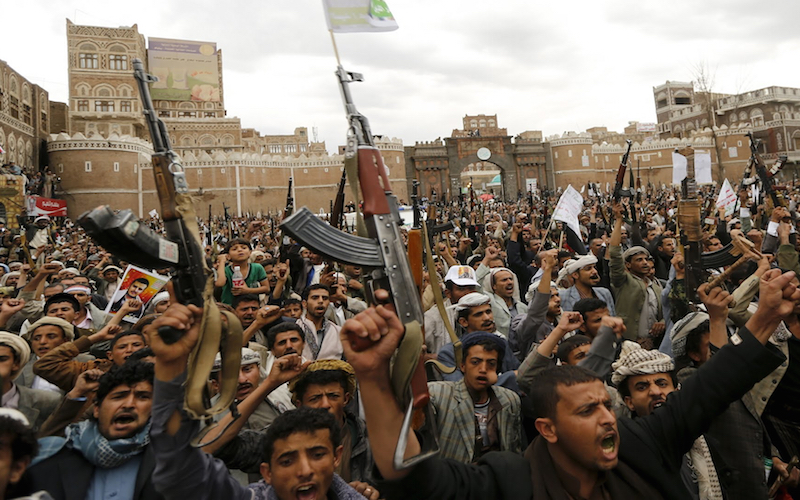
Why the Saudis are Fighting in Yemen
Saudi Arabia’s decision to launch air strikes on territories in Yemen held by the Houthis is perhaps the most important foreign policy decision the Saudi royal family has taken since revolutions started to roll across North Africa and the Middle East four years ago.
Middle East media claim that the kingdom has mobilized up to 150,000 troops to its southern border with Yemen. The goal is primarily to defend the Saudi territory. However, it is also conceivable that the massing of troops at the border establishes the conditions for a ground invasion should the situation require it. Admittedly, it is not possible to confirm the number of troops, and it is still unclear whether such a land invasion is imminent or not. However, the kingdom has demonstrated a clear desire to resist the Houthis; its stated intentions have now been supported with military action. Consequently, it has effectively increased its efforts in a regional power struggle with Iran, which now extends its influence, not to say its sphere of control, into Lebanon, Syria, Iraq, Bahrain and Yemen.
Saudi Arabia’s major foreign policy decisions are often based on a general consensus among a number of senior princes, all members of the royal family. The operation in Yemen is no exception, and had the former King Abdullah still been alive, he would have most likely chosen exactly the same response to the current situation.
This Military operation is a real test for the successor of King Abdullah. Saudi Arabia’s goal is to reinstate as president of the country the now deposed President Abdrabbuh Mansour Hadi.
If that fails, it will be an embarrassing defeat for the kingdom. Therefore, Failure is not an option, especially for King Salman’s 34-year-old son Prince Mohammed bin Salman, who is currently the Saudi defense minister, one of the top positions in the government. The young prince faces enormous risks which could make or break his future career.
His cousin, Prince Khalid bin Sultan bin Abdul Aziz al Saud, engaged in a military operation against the Houthis in Yemen back in 2009. The operation is widely regarded as a failure in the kingdom’s political circles. Prince Khalid’s reputation has been severely sullied until this day. Although Prince Mohammed sits safely and securely in the defense minister’s chair, he would face major problems if the ongoing efforts in Yemen do not bring the desired results. This will be especially the case if his aging father was to pass away – the scheming and crony world of Saudi court politics would find it hard to forgive an unsuccessful military operation in a neighboring country like Yemen.
At this point, there is little prospect that the kingdom is planning to engage in a protracted and expensive conflict. Since 1934 Saudi troops have suffered major problems with the land invasion of Yemen. Military Logistics and supply lines are difficult to maintain and Yemenis know their own treacherous territory better than any outsiders and will use it to their strategic advantage.
Even if Houthi rebels are routed from their strongholds and defeated militarily, a long-term occupation of the country would mean a high cost for the Saudis – financially, politically and in terms of human lives. This begs the question as to what Saudi Arabia is trying to achieve through the use of military power in its southern neighbor. An air campaign alone is not enough to overthrow the Houthis, and a prolonged military operation, including ground troops, would overburden the Saudi military machine.
Messages from Riyadh leave little doubt that the Saudis seek a negotiated solution. This would involve the return of deposed President Hadi to the presidential palace and a peace agreement with the competing Yemeni constituencies – including the Houthis. On this basis, a negotiation on a constitutional agreement would follow. Such a solution could include a more equitable division of provinces and possibly increase the autonomy of South Yemen where the roar of popular secessionist movements is growing louder and angrier by the day.
Is Saudi Arabia seeking a solution in Yemen with the hope of influencing conflicts elsewhere in the MENA (Middle East and North Africa) countries? That is yet another key issue. It is conceivable, for example, that a political agreement in which the Houthis are brought to their knees could be translated into increased leverage over Iran’s intervention in Syria, forcing President Bashar al-Assad to resign, and political gains for Sunnis in Baghdad. It is a huge gamble, but if the region’s current dynamics have been taken into account, the Saudis have probably come to the conclusion that they must use all the tricks in the military and diplomacy book to effectively fight against Iran and its allies.
Iran’s objective on the Yemen issue is clear. Tehran’s preferred political solution to the conflict is to gain the Houthi ally a seat at the negotiation table, which would avoid throwing Yemen into a protracted, low-intensity conflict. But should this scenario turn out to be unrealistic, it would still satisfy the Iranian hardliners to see the Saudis bogged down in a protracted conflict that, Iranians believe they are doomed to lose.
Although Teheran has thus far provided fairly scant logistical, technical and diplomatic support to the Houthis, the strong military response by Riyadh evince that the Iranians have hit the Saudis where they are vulnerable. In real terms, it has cost the Iranians far less time and money in Yemen than what the Saudis have already spent in Syria to affect Iran’s interests.
Meanwhile, the Houthis do not show signs of battle fatigue nor are they likely to drop their arms any time soon. In a televised speech shortly after the Saudi began showering Yemen with airstrikes, Houthi leader, Abdul Malik al-Houthi, defiantly stated that all foreign forces would be met with resistance.
The hope for a settlement lies in the fact that the Houthis, despite their sharp rhetoric, must understand that they are regarded as intruders by the local population and the clan leaders particularly in the north east and south west of Yemen. In one way or another, Houthis will have to eventually make compromises. Otherwise the danger is that Yemen could be plunged into a long and multi-faceted war involving the region’s main state actors.
Such an outcome could soon be an opening for terrorist groups like al-Qaeda and ISIL. To avoid such a nightmarish scenario, stakeholders must feel they can get out of the conflict without losing face. The Syria example has already demonstrated that stakeholders in Yemen will keep on fighting each other as long as they are confident that they win more on the battlefield than they would achieve at the negotiating table.
Richard Rousseau is Associate Professor at the American University of Ras Al Khaimah, United Arab Emirates. His research, teaching and consulting interests include Russian politics, Eurasian geopolitics, international political economy and globalization.

